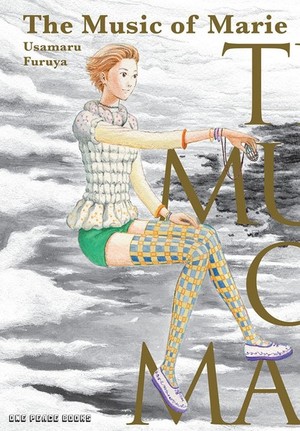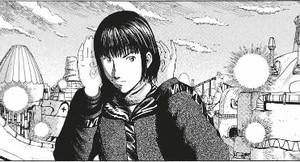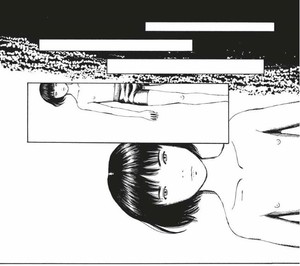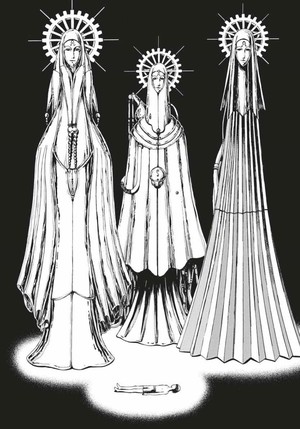The Spring 2022 Manga Guide
The Music of Marie
What's It About?
 Marie floats above her world, giving comfort and protection to all who see her. Her land is peaceful and calm, and none who live in it are hateful or violent. Below her, the boy Kai grows into manhood, and as he does so, he begins to hear the subtle music of Marie, inaudible to others. This music will lead him on a journey of discovery, and grant him a startling realization about the nature of Marie and of the world.
Marie floats above her world, giving comfort and protection to all who see her. Her land is peaceful and calm, and none who live in it are hateful or violent. Below her, the boy Kai grows into manhood, and as he does so, he begins to hear the subtle music of Marie, inaudible to others. This music will lead him on a journey of discovery, and grant him a startling realization about the nature of Marie and of the world.The Music of Marie has story and art by Usamaru Furuya and English translation by Laura Egan. One Peace Books will release the manga in a single collected volume in May.
Is It Worth Reading?

Rebecca Silverman
Rating:
The Music of Marie is one of those books that's hard to talk about. It trades in some slightly suspect philosophy about human nature and how dystopias can become utopias, its big twist isn't all that hard to figure out, and yet it also resonates with you in a way that's difficult to describe. The story takes place on a planet that may very well be our own, thousands of years in the future, where everything is run by clockwork mechanisms that can't progress beyond a certain point in terms of scientific advancement and nobody is poor or angry. It's a utopia by any definition, and it's all watched over by Marie, a giant clockwork woman who circles the world in the sky. Kai can see Marie, and after an incident when he was ten, he can hear the music that she seems to play. He says that at age ten he became a “part of God” (meaning Marie), but what that means we don't fully learn until the end of the 500+ page omnibus volume. All we really know is that he worships Marie in a way that's different from the others who live on his home island, and that his best friend Pipi is in love with him.
How these things come together over the course of the book is what makes it such an experience. Kai and Pipi's relationship is central, but it isn't necessarily a romance in the traditional sense of the word. Marie is always there between them, but again, it's not in a third-wheel kind of way; there's something about Kai's relationship with his goddess that is both organic and unnatural at the same time. The same can be said about the way people live in general in the story – it's almost too perfect, like a brilliantly-created clockwork mechanism that never grinds its gears or wears down. We know there had to have been a price to pay for this, even if the characters don't seem to, and that adds an element of almost despair to the proceedings. Certainly Pipi's apparently unrequited love for Kai adds to this, but while the book is melancholy in places, it's still ultimately hopeful, even in its darkest or saddest moments.
With its intricate designs, philosophical story, and unfaltering examination of humanity and its foibles, The Music of Marie is an interesting book. It isn't one that it's easy to say “I liked it” or “I didn't like it” about because it's not really that keen on any kind of absolute, unless perhaps it's that human nature can't ever be fully trusted. Despite that, it is a book worth reading, especially if old school philosophical science fiction in the Ray Bradbury sense (albeit less scary) is something you enjoy. It isn't easy, but it is worth it.

Christopher Farris
Rating:
There's no shortage of ambition in a work like The Music of Marie. Usamaru Furuya spends a lot of the volume's space on the long, thoughtful world-building of a conceptual, far-flung utopia of a post-modern society. And across that are the seeds planted for the story that eventually crystalizes within the book's pages, and the broader ideas he wants to use that story to analyze. And as languidly-paced as this lengthy tome can feel in that setup, it does have just enough interest points in that early stretch to draw you in. A lot of that's absolutely down to Furuya's artistic abilities on display, regularly dedicating full pages and spreads to depicting the characteristic landscapes of this story's world, or zooming in on the exacting detail of the machinery throughout it. Those elements and more converge in especially breathtaking ways as the story moves into its final phases, as the setting gives way to absurdly detailed mechanical abstractions in full relief for readers to pore over alongside Furuya's more metatextual concepts being communicated.
But apart from that often-impressive presentation, it's those concepts that prove the stumbling block to The Music of Marie's success. The issues become apparent basically the moment the first gravamen of an actual conflict manifests in the book, punctuated by what's definitely supposed to be a serious, dramatic turn, but might seem too outlandish or even juvenile to land with the desired gravity. From there the trip through the plot provokes the question of whether a story can be imaginative in abstract structure, yet still sledgehammer-esque in presenting its internal plot beats. And that's before getting into the conceptual explorations I just fundamentally disagree with. Furuya ends up reaching for the argument that technological progress serves as a direct instigator of discord in human society, but while it's admittedly easy to see how he came upon that correlation, I like to think the fallacies of it are clear with just a moment's more consideration. The limited space of a manga preview write-up obviously isn't the place to get into the weeds analyzing socio-historical factors of human conflict, but suffice it to say that people were fighting each other long before they invented airplanes. This ties in with Furuya's meditations on religion, and the supposition that a broadly-accepted belief system would be the key to overseeing a utopia such as this. It's a nice idea, and I'll say it's illustrated effectively within the story told here, but it's also provably untrue with precedent.
For all the typical chestnuts that The Music of Marie looks to be stumbling into regarding humanity having freedom even at the cost of a peaceful interconnected existence, I'll give props to Furuya for not taking the completely expected route by the end. I'm staying abstract for the sake of spoilers, but the resolution to the story's ultimate decision might not be what you're conditioned to expect from something like this. It's a turnaround that's even downright funny from the right angle. On the other hand, there is one final final plot twist that might be a bridge too far in the "Oh come on!" department for some readers. Though that bit actually has the distinction of potentially recontextualizing the whole piece as less of a treatise on the nature of humanity and their progress, and instead a more personal meditation on the role of religious interpretation as long-form trauma response. And I honestly find that to be a way more compelling concept to base this story around. There are definitely some fundamental disagreements I can lob at The Music of Marie's analytical concepts, as well as many of its basic plot beats. But I can't fault it too hard for putting a lot of effort behind its ambition, which does show in the extremely cool visuals throughout this thing. I would say that if any of the concepts I've mentioned piqued your interest, this might be worth picking up just to read it for yourself and confirm your own reaction to Furuya's efforts.

MrAJCosplay
Rating:
The Music of Marie is a long, well-paced walk into an extraordinary fantasy world. There is an air of mystery to how this world works both for the audience and those who live within it, where technology takes on this almost ethereal presence. Our main characters have their quirks and their own thoughts about the influence of those that they worship, but there is a well-established connection there built upon a childhood connection and sense of wonder. That draw to the unknown can be dangerous, but sometimes satiating that curiosity can also be worth the risk. The more I read about this world, the more I find myself sinking into its gorgeous imagery and frightening undertones. While not all of it is as hopeful as most people might like, there is still a sense of wonder to be had here that I think many can and should enjoy.

Jean-Karlo Lemus
Rating:
The Music of Marie is a very profound fantasy novel that I wasn't quite ready for. It is the coming of age story of Pipi and Kai, a pair of youths that live on the island of Pirito. Their world is watched over by Marie, a flying clockwork colossus, and only Kai can hear the song that she plays as she drifts over the land, ever-watchful. As the days go by, we learn more and more of life on the island of Pirito—and of the nature of Marie herself. Kai is closely involved with all of it, and that connection might cost Pipi a lot of suffering.
The Music of Marie both establishes a beautiful alternate-Earth world with rich cultures and fascinating ways of day-to-day living while also boasting the artistic chops needed to fully realize such grand ideas. The image of a massive clockwork angel flying in the sky is evocative enough to carry this whole book; the lovely fashions, homes, and cultures of this lived-in Earth rise up to meet it. And amidst it all, we have Pipi and Kai growing up and facing the inevitable tragedy of adulthood. This is an unforgettable world in an unforgettable manga, and I really can't recommend this one strongly enough. Keep an eye out for The Music of Marie.
discuss this in the forum (58 posts) |
back to The Spring 2022 Manga Guide
Feature homepage / archives